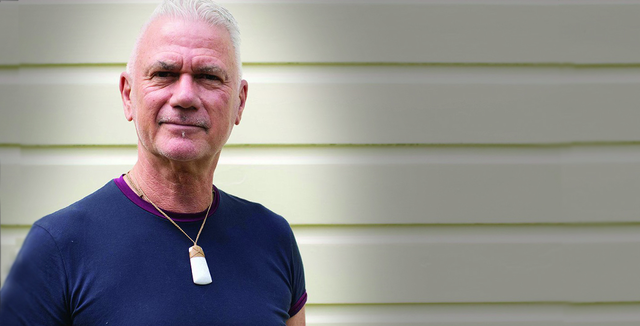Māori Churchill Fellowship recipient to investigate First Peoples suicide prevention
24 October 2019
● News and media
ANZSOG’s inaugural Aotearoa-New Zealand Indigenous Churchill Fellowship has been awarded to Dr Clive Aspin for his proposal to investigate suicide prevention initiatives among the Indigenous peoples of Canada – First Nations, Inuit and Metis.
Dr Aspin is a member of the iwi of Ngāti Maru in Hauraki, Aotearoa where he grew up.
A senior specialist advisor to the Suicide Mortality Review Committee at the New Zealand Health Quality and Safety Commission (HQSC), he said the Fellowship would provide an opportunity to visit Canada and meet with experts, leaders, and communities as well as attend a global Indigenous suicide prevention conference in Winnipeg.
“The high rates of suicide rates among Māori are evidence of the shameful health disparities that exist in New Zealand. The rate is twice that of the rest of the population, that’s a big disparity which is also reflected in statistics in Canada and Australia,” he said.
“We need to address the social determinants of suicide and work with communities to develop solutions. The First Peoples of New Zealand, Canada and Australia share a history of colonisation and inter-generational trauma, which underpin high suicide rates.”
Dr Aspin said the lessons learned in Canada would add to the body of knowledge about Indigenous suicide and would be highly relevant to suicide prevention in New Zealand.
“Canada has seen the development of some innovative community-based solutions to this serious problem. Solutions to these social problems lie within the community, and the extent to which we engage with the community and make sure they are adequately resourced, can determine their success.”
He said that in New Zealand the silence around suicide as an issue was being broken, and it was no longer‘ kept hushed up’ as in the past.
One important key was support for families in the aftermath of a death by suicide, and ensuring the availability of mental health support and services when needed.
“For Māori, many suicide services are not culturally appropriate, and Māori can’t engage with them in a way that feels safe. We need to make sure there are services they can engage with in a safe and secure way which gets back to community engagement, and recognising the unique circumstances of each community,” he said.
Dr Aspin previously worked for the Ministry of Māori Development, before working overseas for several years. He returned to New Zealand and the public sector three years ago, committed to make a difference to issues impacting on Māori health.
He said that the Fellowship would be a once-in-a-lifetime chance, and he was very grateful to have been chosen.
“It is tremendous recognition of a really important issue as well as the contributions of all the people working in the area of suicide prevention.”
HQSC chief executive Dr Janice Wilson said the Churchill Fellowship would provide significant benefits to the Suicide Mortality Review Committee and to suicide prevention programmes more broadly.
“Clive is a worthy recipient of the inaugural award and I know he will find the time he spends in Canada extremely valuable,” she said.
“During his career as a public health researcher, Clive has developed strong networks with colleagues in Canada. The Churchill Fellowship will provide opportunities to learn lessons from the Canadian experience and bring them back to Aotearoa-New Zealand to inform national suicide prevention strategies.”
The Fellowship is one of two ANZSOG has created in partnership with The Winston Churchill Memorial Trust in Australia and the Churchill Trust in New Zealand.They are part of ANZSOG’s commitment to build First Peoples leadership in public services and improve outcomes for communities.
The Fellowships are an invaluable opportunity for recipients to gain insights into the practices of their peers working in international jurisdictions, and contribute to Indigenous policy, governance and administration thinking in Australia and New Zealand upon their return.
“We want to play our part in building strong Aboriginal, Torres Strait Islander and Māori leadership in the public sector,” said ANZSOG Dean and CEO Ken Smith.
“Better representation of First Peoples at all levels of our public services is essential, in order to include Indigenous perspectivesin policy development and incorporate Indigenous knowledge and culture into the work of government.”
The inaugural Indigenous Churchill Fellowship recipient was recently announced as Alphonsus Shields, an Alice Springs-based Senior Constable and General Duties Policeman in the Northern Territory Police.
Where to get help in New Zealand
Need to Talk? Free call or text 1737 any time to speak to a trained counsellor, for any reason.
Lifeline: 0800 543 354 or text HELP to 4357
Suicide Crisis Helpline: 0508 828 865 / 0508 TAUTOKO (24/7).
Depression Helpline: 0800 111 757 (24/7) or text 4202
Samaritans: 0800 726 666 (24/7)
Youthline: 0800 376 633 (24/7) or free text 234 (8am-12am), or email talk@youthline.co.nz
What’s Up: online chat (3pm-10pm) or 0800 WHATSUP / 0800 9428 787 helpline (12pm-10pm weekdays, 3pm-11pm weekends)
Kidsline (ages 5-18): 0800 543 754 (24/7)
Rural Support Trust Helpline: 0800 787 254
Healthline: 0800 611 116
Rainbow Youth: (09) 376 4155
If it is an emergency and you feel like you or someone else is at risk, call 111.
Where to get help in Australia:
Lifeline on 13 11 14 , Beyond Blue on 1300 224 636 or the Suicide Call Back Service 1300 659 467.
If it is an emergency and you feel like you or someone else is at risk, call 000.
